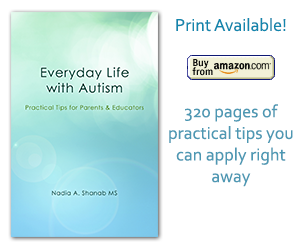By Nadia Shanab | Uncategorized
A new research study found that children with autism can be trained to aquire the social cognitive skills that would help them detect when people are lying to them. Spectrum children can also be trained to respond to bullies and protect their posessions. Parents’ concerns formed an important input for researcher to complete this study.
Tags: ABA (Applied Behavior Analysis), asperger's syndrome, autism, communication, discipline, independence, legal rights, parenting, social cognitive skills, social interaction, techniques, tips
Posted in Uncategorized | Comments Off on Kids with Autism Can Learn to Detect Lies and Respond to Bullies
By Nadia Shanab | Uncategorized
A study titled: “Developmental Meta-Analysis of the Funcitonal Neural Correlates of Autism Spectrum Disorders,” found that the brain activity changes as individuals with autism age. They found that the change in brain activities keeps developing over time. This is the first study to show that. “If the shift in the parts of the brain that
Tags: aging, autism, brain activities, flexibility, health, parenting, research, techniques
Posted in Uncategorized | Comments Off on Brain Activities Change As Individuals with Autism Age
By Nadia Shanab | Uncategorized
“Signs of autism can be detected in the brains of 4-months old infants.” Researchers used near-infrared spectroscopy (NIRS) to study the brain activity of two groups of infants, one of which had a sibiling with autism. The babies were tested during a socially interesting human actions, (peek-a-boo), as well as while listening to some vocal
Tags: autism, early detection, health, research, signs, symptoms of autism
Posted in Uncategorized | Comments Off on Scanner ‘Shows Early Autism Signs’
By Nadia Shanab | Uncategorized
Speech and language Pathologists (SLP) found that half of the children have echolalia as part of their language development progress. The difference between NT (Neuro Typical) kids with and without echolalia (NOT including ASD kids) is that their self-generated language develops later, but eventually they still can catch up. Spectrum kids, on the other hand,
Tags: autism, communication, flexibility, health, parenting, speech, Temple Grandin, transition
Posted in Uncategorized | Comments Off on Echolalia Signals A Delay Not A disorder
By Nadia Shanab | Uncategorized
It is much easier to deal with sensory issues in younger children with ASD wether at home or in classrooms. Wearing headphones and typical weighted vest is much less tolerated in junior high or high school. How can you help your teenager with ASD? Tips 1- To relieve stress, replace the figity objects with stress
Tags: autism, communication, discipline, organization, parenting, senses, sensory, social interaction, techniques, tips
Posted in Uncategorized | Comments Off on Tips to Help Teens with Sensory Issues
By Nadia Shanab | Uncategorized
The Autism Research Group (ARG) in San Diego, California, is hosting an intense one-day workshop about “Effective Autism Behavior Intervention Techniques”. The workshop will be held in San Diego on April 29, 2013 at the Catamaran Resort and Spa from 9:00 am to 4:00 pm. The Center focuses on ABA (Applied Behavior Analysis) which is
Tags: autism, communication, discipline, flexibility, health, independence, occupational therapy, parenting, research, social interaction, techniques, tips, visual aids, workshop
Posted in Uncategorized | Comments Off on Teaching Perspective-Taking and Executive Function Skills
By Nadia Shanab | Uncategorized
Laughter is one of the most common and pleasant opportunities to socialize and connect with people. Laughing is interactive; it takes two or more people to share such a great social moment. Relationships can develop easily and naturally in such a relaxed context. We have agreed before that individuals with autism are just like anybody
Tags: autism, communication, flexibility, health, independence, laughter, occupational therapy, parenting, social interaction, speech
Posted in Uncategorized | Comments Off on The Laughter Therapy
By Nadia Shanab | Uncategorized
“If individuals with ASD find communicating with others a challenge, it makes sense that they may also find it more difficult to communiate with themselves.” Durham University, Bristol University, and City University in the U.K. A research was done to solve a puzzle. When neurotypical individuals were interrupted by repeating a word, 90% worked much
Tags: autism, communication, consequences, health, independence, research, speech
Posted in Uncategorized | Comments Off on Developing Internal Speech Might Help The Thinking Process
By Nadia Shanab | Uncategorized
In my opinion, this is the best definition of autism I have ever heard. A young autistic woman from the U.K. described having autism like having a “different operating system“. Can we run a Mac on windows operating system? When are people going to admit that having ASD (Autism Spectrum Disorder) is “a way of
Tags: asperger's syndrome, autism, communication, health, independence, legal rights, occupational therapy, parenting, research, tips
Posted in Uncategorized | Comments Off on A New Definition of Autism
By Nadia Shanab | Uncategorized
A very insightful article in the the British “Guardian” newspaper, what parents of children with autism think about a cure. Some parents are very realistic, others are in denial. How does the media participate in helping/discouraging parents. Cure? Therapy? What is the most important support, resources do parents need? Read what parents say here: www.guardian.co.uk/commentisfree/2013/mar/01/parents-children-autism-cure
Tags: asperger's syndrome, autism, communication, cure, legal rights, occupational therapy, parenting, placement, research, social interaction, speech, transition
Posted in Uncategorized | Comments Off on What Does “Cure” Means to Parents?

